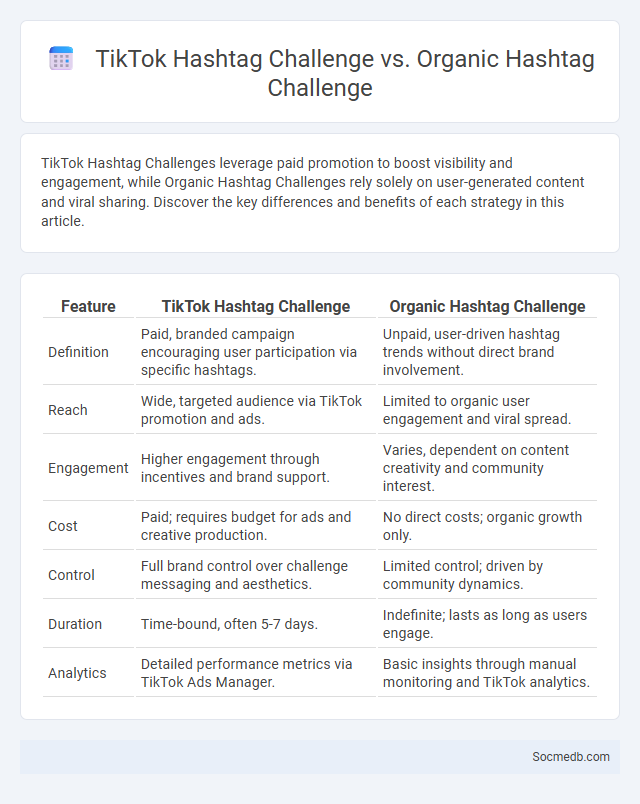
Photo illustration: TikTok Hashtag Challenge vs Organic Hashtag Challenge
TikTok Hashtag Challenges leverage paid promotion to boost visibility and engagement, while Organic Hashtag Challenges rely solely on user-generated content and viral sharing. Discover the key differences and benefits of each strategy in this article.
Table of Comparison
| Feature | TikTok Hashtag Challenge | Organic Hashtag Challenge |
|---|---|---|
| Definition | Paid, branded campaign encouraging user participation via specific hashtags. | Unpaid, user-driven hashtag trends without direct brand involvement. |
| Reach | Wide, targeted audience via TikTok promotion and ads. | Limited to organic user engagement and viral spread. |
| Engagement | Higher engagement through incentives and brand support. | Varies, dependent on content creativity and community interest. |
| Cost | Paid; requires budget for ads and creative production. | No direct costs; organic growth only. |
| Control | Full brand control over challenge messaging and aesthetics. | Limited control; driven by community dynamics. |
| Duration | Time-bound, often 5-7 days. | Indefinite; lasts as long as users engage. |
| Analytics | Detailed performance metrics via TikTok Ads Manager. | Basic insights through manual monitoring and TikTok analytics. |
Introduction to Hashtag Challenges
Hashtag challenges on social media encourage users to create and share content around a specific theme or trend, amplifying engagement and visibility. These challenges leverage viral participation and user-generated content to boost brand awareness and community interaction. You can capitalize on hashtag challenges to increase your social media reach and foster audience connection effectively.
What is a TikTok Hashtag Challenge?
A TikTok Hashtag Challenge is a branded campaign where users create and share videos using a specific hashtag to participate in trends or contests. These challenges drive user engagement and content creation, leveraging TikTok's algorithm to boost visibility and virality. Brands and influencers often use Hashtag Challenges to increase reach, foster community interaction, and promote products or messages effectively.
Defining Organic Hashtag Challenge
The Organic Hashtag Challenge leverages user-generated content where participants create posts using specific hashtags without paid promotion, driving authentic engagement and community growth. Your brand can amplify visibility and foster genuine interactions by encouraging followers to join these hashtag-driven campaigns. Measuring the organic reach and engagement rates of these challenges provides valuable insights into audience participation and content resonance.
Understanding Standard Hashtag Challenges
Standard hashtag challenges on social media drive user engagement by encouraging participation through trending tags that promote content discovery and community interaction. These challenges often leverage specific hashtags to create viral campaigns, increasing visibility for brands and creators within targeted audiences. Measuring the success of hashtag challenges involves analyzing metrics such as hashtag usage volume, reach, and user-generated content quality to optimize future social media strategies.
Key Differences: TikTok vs Organic vs Standard
TikTok's algorithm emphasizes short, engaging video content for rapid organic reach, contrasting with traditional organic social media strategies that rely on consistent posting and community interaction to build long-term engagement. Standard social media approaches often incorporate a mix of paid advertising and organic content to optimize visibility and audience targeting. Understanding these distinctions helps you tailor your content strategy for maximum impact on each platform.
Audience Engagement in Each Challenge Type
Different social media challenge types generate varied levels of audience engagement by catering to specific user interests and interaction styles. Visual challenges, such as photo contests, typically drive high participation through creative expression and sharing, while hashtag challenges encourage widespread visibility and community building by uniting users under a common theme. Interactive challenges that involve polls, quizzes, or direct user input tend to foster deeper engagement by prompting active involvement and real-time responses.
Marketing Strategies for Hashtag Challenges
Hashtag challenges on social media drive user engagement by encouraging participation through trending, branded tags, boosting brand visibility and awareness. Marketing strategies for hashtag challenges include designing creative, shareable content and leveraging influencers to amplify reach across platforms like TikTok and Instagram. Tracking challenge-specific metrics such as hashtag impressions, user-generated content volume, and engagement rates maximizes campaign effectiveness and ROI.
Measuring Success: Metrics and KPIs
Measuring success on social media relies on key performance indicators (KPIs) such as engagement rate, reach, follower growth, click-through rate (CTR), and conversion rate. Analyzing metrics like impressions, shares, comments, and sentiment analysis provides insights into audience interaction and content effectiveness. Tracking these data points enables marketers to optimize campaigns, enhance brand visibility, and drive higher ROI.
Best Practices for Effective Hashtag Challenges
Effective hashtag challenges on social media maximize user engagement by encouraging creativity and clear participation guidelines. Brands should leverage trending keywords and relevant hashtags to amplify reach while monitoring analytics to optimize timing and audience targeting. Consistent brand voice and incentivizing user-generated content foster community building and long-term visibility.
Choosing the Right Hashtag Challenge for Your Brand
Choosing the right hashtag challenge for your brand amplifies engagement by targeting a specific audience aligned with your brand identity. Research trending challenges within your niche and analyze their reach and relevance to ensure maximum visibility and participation. Your strategic selection of hashtags influences campaign success, driving authentic user interaction and brand awareness effectively.
 socmedb.com
socmedb.com